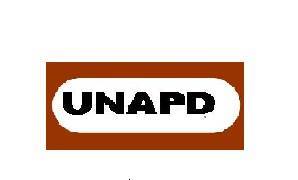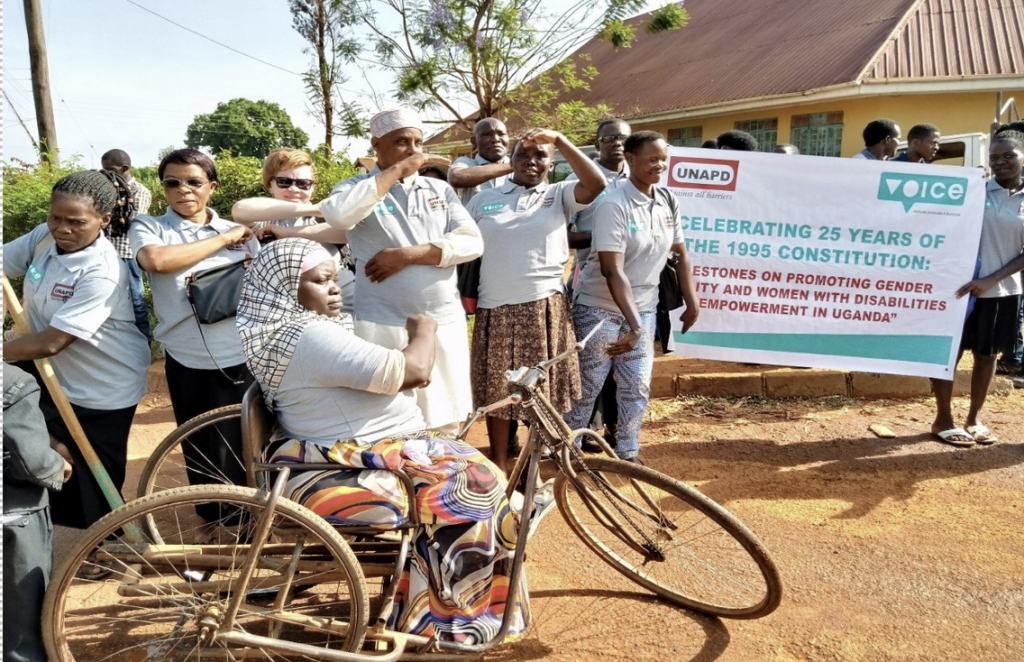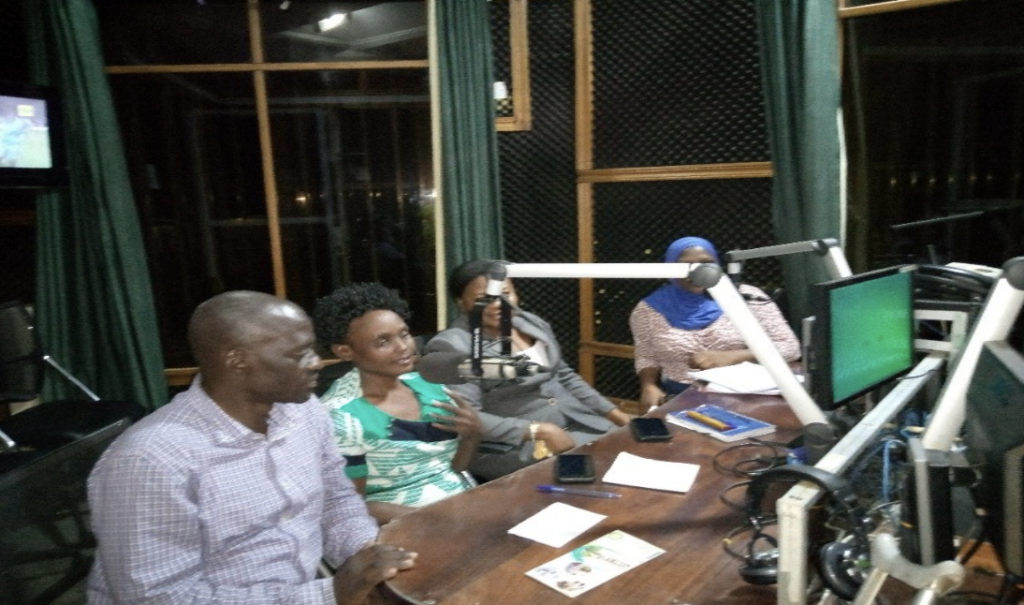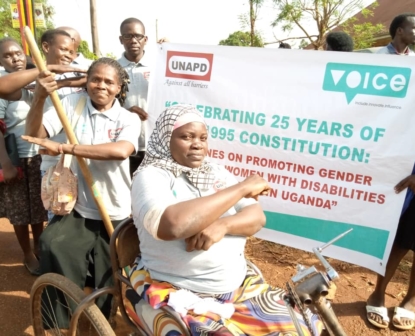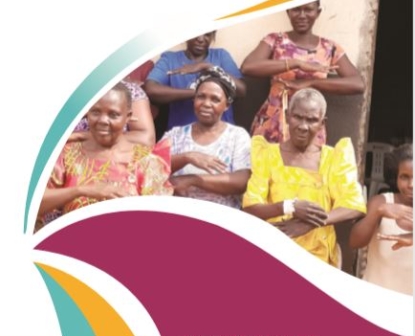Project
Inclusive implementation of the national policy and service standards for SRHR
-
Amount Funded
130,000 EUROProject Duration
01 Dec 2018 - 31 Dec 2019 -
-
Lead organisation
-
Uganda National Action on Physical Disability (UNAPD) visualises a society where people with physical disabilities live dignified and productive lives. This is possible through existing to remove barriers that prevent persons with physical disabilities from enjoying their full rights in society. UNAPD has impacted a lot on policy/law influence in order to get inclusive legislations for PWDs through engaging in guidelines development and policy review to ensure that the laws/legislations passed by the Parliament of Uganda and other local government structures are not discriminatory to Persons with Disabilities (PWDs).
Of recent, UNAPD worked tirelessly with the Members of Parliament representing PWDs to ensure that the debate (in 2013) on Building Control Bill in Parliament considers the accessibility rights of PWDs through including the Accessibility Standards as a reference policy document on matters of accessibility and inclusion before the enactment by the Parliament. Those efforts bared fruits in that by the time the Act was signed by the President of Uganda in 2013, the Accessibility Standards were adopted as the reference documents and PWDs have to be represented on the various building committees and the National Building Review Board.
-
Organisation
Uganda National Action on Physical Disability (UNAPD) visualises a society where people with physical disabilities live dignified and productive lives. This is possible through existing to remove barriers that prevent persons with physical disabilities from enjoying their full rights in society. UNAPD has impacted a lot on policy/law influence in order to get inclusive legislations for PWDs through engaging in guidelines development and policy review to ensure that the laws/legislations passed by the Parliament of Uganda and other local government structures are not discriminatory to Persons with Disabilities (PWDs).
Of recent, UNAPD worked tirelessly with the Members of Parliament representing PWDs to ensure that the debate (in 2013) on Building Control Bill in Parliament considers the accessibility rights of PWDs through including the Accessibility Standards as a reference policy document on matters of accessibility and inclusion before the enactment by the Parliament. Those efforts bared fruits in that by the time the Act was signed by the President of Uganda in 2013, the Accessibility Standards were adopted as the reference documents and PWDs have to be represented on the various building committees and the National Building Review Board.
-
Project
The project inclusive implementation of the national policy and service standards for SRHR in Uganda is being implemented by three organisations of persons with disability. These are umbrella organisation of Persons with Physical Disabilities (PWPDs), Pallisa District Action on Physical Disabilities (PADIAPD) and Mbale Action on Physical Disabilities. Sexual and Reproductive Health and Rights (SRHR) of Persons with Disabilities (PWDs) is overlooked by both the disability community and those working on Sexual and Reproductive Health Services (SRHS).
This leaves PWDs among the most marginalised groups when it comes to SRHS despite having the same needs for SRHS as everyone else. The challenges to SRH faced by PWDs are not necessarily part of having a disability, but instead often reflect lack of social attention, legal protection, understanding and support. PWDs often cannot obtain even the most basic information about SRH thus remain unaware of basic facts about their bodies, rights and available services. PWDs may be denied the right to establish relationships, or they may be subjected to sexual abuse or treated as objects in the house other than members of the family.
As a group, PWDs fit the common pattern of structural risks for HIV/AIDS and other sexually transmitted infections due to high rates of poverty and illiteracy, lack of access to health resources and power to negotiate for safer sex. This project focuses on the fact that PWDs have the same sexual and reproductive health (SRH) needs as other people. Yet they often face barriers to information and services. At the end of the project, the Organisation hopes to have changed the ignorance and attitudes of society and individuals, including health-care providers, raising most of these barriers.
-
-
The project inclusive implementation of the national policy and service standards for SRHR in Uganda is being implemented by three organisations of persons with disability. These are umbrella organisation of Persons with Physical Disabilities (PWPDs), Pallisa District Action on Physical Disabilities (PADIAPD) and Mbale Action on Physical Disabilities. Sexual and Reproductive Health and Rights (SRHR) of Persons with Disabilities (PWDs) is overlooked by both the disability community and those working on Sexual and Reproductive Health Services (SRHS).
This leaves PWDs among the most marginalised groups when it comes to SRHS despite having the same needs for SRHS as everyone else. The challenges to SRH faced by PWDs are not necessarily part of having a disability, but instead often reflect lack of social attention, legal protection, understanding and support. PWDs often cannot obtain even the most basic information about SRH thus remain unaware of basic facts about their bodies, rights and available services. PWDs may be denied the right to establish relationships, or they may be subjected to sexual abuse or treated as objects in the house other than members of the family.
As a group, PWDs fit the common pattern of structural risks for HIV/AIDS and other sexually transmitted infections due to high rates of poverty and illiteracy, lack of access to health resources and power to negotiate for safer sex. This project focuses on the fact that PWDs have the same sexual and reproductive health (SRH) needs as other people. Yet they often face barriers to information and services. At the end of the project, the Organisation hopes to have changed the ignorance and attitudes of society and individuals, including health-care providers, raising most of these barriers.
-
The project allowed for improved collaboration with Sexual Reproductive Health and Rights organisations to improve Sexual Reproductive Health and Rights for PWDs. A Memorandum of Understanding (MOU) was signed with Reproductive Health Uganda (RHU) which resulted into a number of joint interventions such as training of RHU staff on disability awareness in Kampala and Luwero Districts and mainstreaming and accessibility auditing of RHU service centers. The accessibility auditing of a number of health centers resulted into usage of the Accessibility Standards for instance in Pallisa District, accessibility standards for persons with disabilities were observed during construction of a new office building. Persons with Disabilities are now open to articulate their sexual reproductive health needs and to seek SHR services openly and to make choices about their preferred options. Health workers are now aware about the SRH rights of PWDs and are open to respond to their needs. Through UNAPD’s advocacy and networking efforts, Marie Stopes was able to facilitate 10 PWDs to participate in the 3rd Uganda National Family Planning conference. Marie Stopes and Reproductive Health Uganda(RHU), the leading SRHR organisations in Uganda have embraced disability inclusive SHR services throughout their programs. PWDs representatives at different levels including sub county, District have been empowered to voice SRHR issues of PWDs and ensure their inclusion into Local government plans and budgets.
UNAPD as an institution embarked on fundraising for projects that are health related because of the experience gained during project implementation and to respond to the health needs of PWDS. There has been improvement of accessibility at some facilities both government and private. Pallisa district local government constructed a shelter from Out Patients Department(OPD) to maternity ward at Kameke health center III to ease accessibility for mothers with disabilities, Spotlight on Africa Uganda Mbale branch constructed ramps and purchased wooden steps for delivery beds to try to easy access by PWDs who use their facility in Mbale. RHU requested for an accessibility audit of all their Kampala service centres to come up with recommendations of how they can improve accessibility.

PWDs participate in the Uganda Women’s Day Commemorations while advocating for improved access to SRH services. 
On the left is UNAPD chairperson Mbale Action and Physical Disability, and Assistant District Health Officer (in grey suit) and Project Staff discussing SRHR services affecting PWDs and how to improve service access on District radio station in Mbale town. -
News

